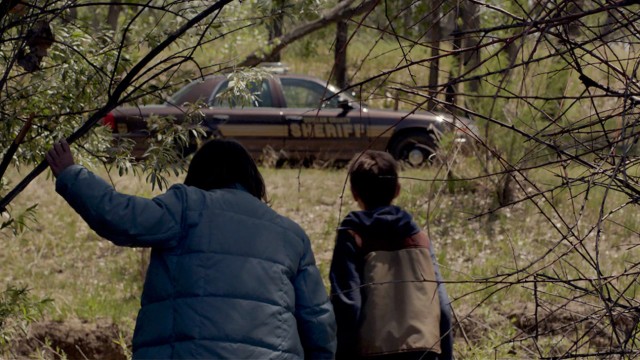30 years ago this November, Bill Watterson created a landmark comic strip about a boy and his stuffed tiger. Calvin and Hobbes was a vision of the world of children written from an adult through the eyes of an innocently mischievous child. Everything that existed was meant to be questioned, adults were frequently seen as alien and monstrous (sometimes literally), and the way the world operated was a grand mystery meant to be unfolded. And, yet, Calvin was quite a terror who would operate on a logical scale in a world of his own that was familiar and yet frequently scary to the adults.
The world of Calvin and Hobbes hangs over Cop Car from the first frame. Travis and Harrison are two kids who have decided to run away from home. By “running away,” I mean they’re hiking across farms in rural Colorado with little more than a backpack, probably headed to the Yukon. They’re whiling away their time repeating curse words at each other to question the world of the adults, and to also steel each other against the world’s ills and to seem tougher. After awhile, they find a seemingly abandoned police car in the middle of the forest with the keys in the visor. Without having anything better to do, they take it for a joy ride!
Unfortunately for them, the cop car belongs to the corrupt Sheriff Kretzer (Kevin Bacon) who was busy burying a body in the forest when the kids discovered the car. While the kids are having fun seeing how the car and everything in it operates, Kretzer spends the movie trying to get the car back while keeping the missing car a secret from the rest of the police department.
Directed by Jon Watts, who made his name directing The Onion News Network and Onion Sportsdome, Cop Car is a tiny movie of modest ambition. For budgetary reasons, Watts keeps the cast small, and shoots primarily in the exterior. Though a darkly comic coming-of-age story it may be, with grand rural exterior shots reminiscent of Stand By Me, Cop Car doesn’t hit the audience over the head with the children maturing through their experiences. Watts keeps the action fast moving and comic, but never promises more than he delivers. He tells a story of two kids learning how the world operates and realizing the outside world is more malicious than even they thought possible.
In the vein of Calvin and Hobbes, the world of Cop Car is a cartoon operating on the side of understandable. It would not have been unexpected if, during their travails, Travis and Harrison had spontaneously turned into spacemen and seen the cop car as their craft landing on a foreign landscape. Watts eschews these flights of fancy in order to keep things as grounded and budget-friendly as possible. Still, Watts never quite makes Cop Car as deep, or meaningful as Calvin and Hobbes. If Watts isn’t nearly as cutting as Watterson, it’s because he finds more humor in tension than in insight, presenting the only problem with Cop Car. It’s slight, and just a diversion that one will struggle to remember weeks after you’ve seen it. For what it is, it’s a solidly-executed funny-as-hell quip of a dirty grey comedy.

